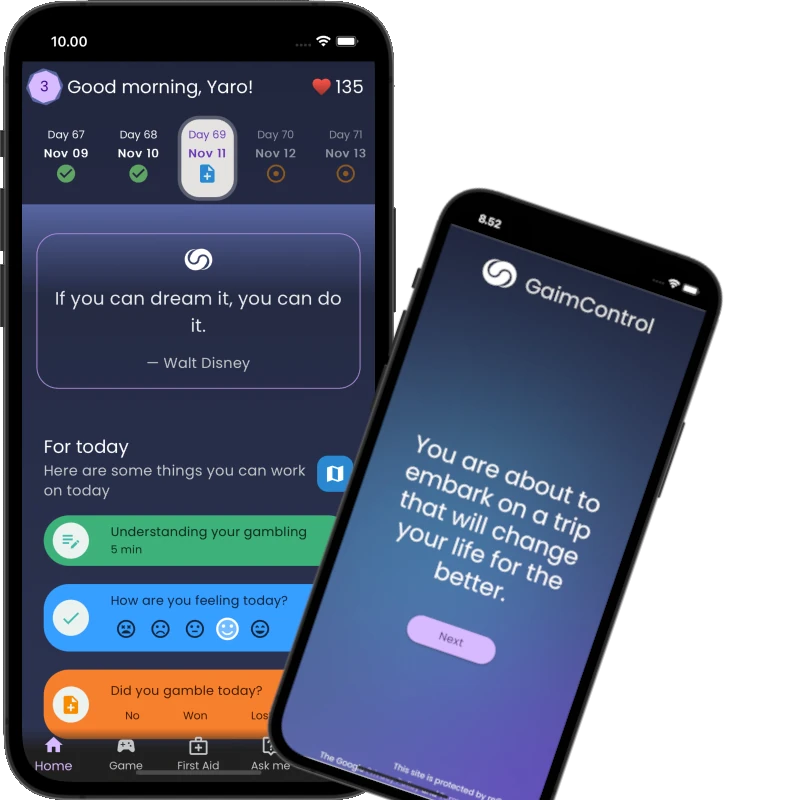A study published in the Journal of Gambling Studies found that online gambling activity increased by 30% during the initial months of the pandemic. The COVID-19 pandemic was an unprecedented global event that reshaped many aspects of our lives—and for some, it created new challenges around gambling behaviour.
As industries shut down and daily routines were disrupted. There’s no denying that the past years have dramatically increased our universal stress levels. This surge was likely driven by factors such as increased free time, social isolation, and the availability of online gambling platforms.
People searched for new ways to cope with stress, boredom, and isolation. Unfortunately, for some, gambling became a way to fill their emotional and financial void. If you’ve found yourself turning to gambling more frequently over the last few years, you’re not alone.


GaimControl with neuroscience-based daily activities
Recent Trends: Is Gambling Still on the Rise?
Recent data suggests that, while some aspects of life have returned to normal. Gambling activity remains elevated compared to pre-pandemic levels. Studies show a resurgence in both online gambling and sports betting, with the latter experiencing a dramatic rise in popularity as major leagues resumed operations last month.
Online Gambling Activity: remains at elevated levels, with sports betting seeing particularly strong growth. Apps like FanDuel and DraftKings continue to report rising user numbers, especially among younger adults. Online casinos have also made remote gambling behaviour the norm.
Younger Demographics at Risk: Analysts have observed that younger adults—particularly men aged 18-35,—have been heavily drawn to both online casinos and esports betting.
Surge in Sports Betting: Sports betting has exploded in popularity, particularly after legalization in several regions in the US and across the world. Events like the Super Bowl and World Cup have generated record-breaking betting numbers.
Financial Pressures: As inflation and the cost of living crisis persist, some individuals may gamble in the hope of turning small bets into significant financial wins, further exacerbating risky behaviours.
Seeking Help: Self-exclusion programs saw a 41% increase in participation since 2022, showing that many people are still struggling. Gambling helplines continue to receive more calls than before the pandemic, with some months this year showing a 50% rise in gambling-related inquiries. However the stigma of seeking help is slowly diminishing as mental health awareness increases, but many people are still unaware of available resources.

Discover your improvement chart with our personal assessment

The Road Ahead: Addressing the Long-Term Impact
It’s clear that many of the habits formed during the last few years have left lasting effects. Gambling behaviour remains a challenge, with industry growth continuing and the number of people seeking to quit or reduce rising. However, increased awareness around mental health, improved access to online support groups, and self-exclusion programs are positive steps forward.
It’s important to recognize that change is possible, whether seeking help from professional, support networks or using novel digital tools for mental health. Prioritizing mental health and healthy coping mechanisms is essential to overcoming these challenges.
If you or someone you know is considering quitting or reducing gambling, know that you are not alone, and there is support available to help you regain control.
At GaimControl, we offer a neuroscience-based approach to help you reevaluate your gambling habits. Our evidence-based program provides personalized tools, support, and education to help you change the way you think about and engage with gambling. With daily tasks, progress tracking, a private community, and a variety of tools, GaimControl offers everything you need to improve your relationship with gambling.

Take back control of your gambling with GaimControl
Learn
Discover
Master
